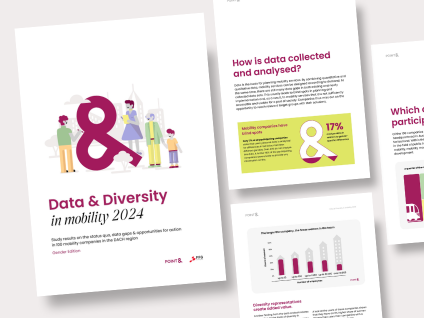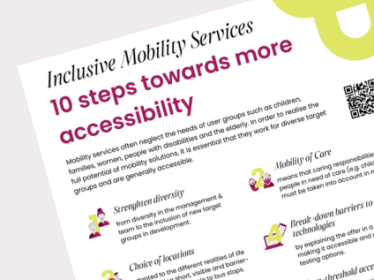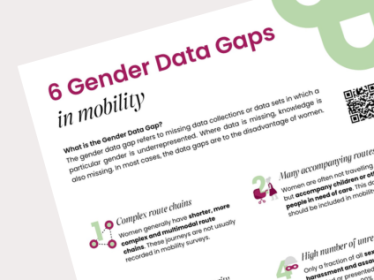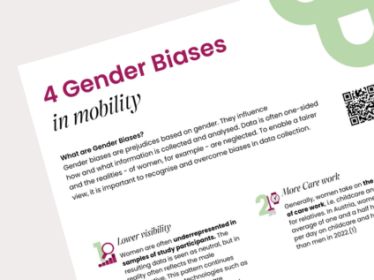Report Data & Diversity in mobility 2024

This report offers valuable and in-depth insights into the present state of data and diversity in the mobility sector, with a particular focus on women. By analyzing responses from 100 companies across Germany, Austria, and Switzerland (DACH-region), it sheds light on the current conditions, highlights data gaps, and suggests practical steps for action.


What?
Comprehensive report on the status quo, data gaps and opportunities for action focussing on women as employees and users

Who?
Collection and analysis of data from 100 mobility companies in the DACH region – from public transport to the automotive industry.

How?
Conducting the study using qualitative interviews and quantitative online surveys. Publication date: February 2024
Topics and insights from the report:
The data-based report shows how relevant gender diversity is to the mobility industry, from employees to users. With concrete figures, strategies and best practice examples, it shows the path to fair mobility solutions and their economic value.
Diversity in mobility - data, facts and solutions
- Detailed facts, figures and data on gender diversity among employees and users in the mobility sector in the DACH region.
- Fields of action for fair mobility from corporate culture, data collection and analysis to monitoring.
- Measures for designing mobility solutions and working environments that appeal to diverse target groups.
- Best practices from companies that are already successfully implementing diversity and data-based innovation.
Did you know that…?
- The more women on management level in companies, the higher the share of women in the workforce and the more women use the service.
- A third of mobility companies do not collect any information on the age, gender or place of residence of their users.
- Companies with a high proportion of women in product development also have a higher share of female users.
- Only 17% of the participating companies stated that personal data is examined for behavioural differences between different genders.
Unlock Your Potential and Seize New Opportunities!
This report offers not only valuable insights but also actionable strategies. Whether in management, sales, or product development – our training programs, workshops, and design sprints enable businesses to leverage the full power of mobility solutions.
Get in touch to implement these insights within your organization and capture opportunities that have gone unnoticed.
Deepen your knowledge and download our factsheets now!

Factsheet
10 steps towards more accessibility
Mobility services often neglect the needs of many people such as children, families, women, people with disabilities and the elderly. To realize the full potential of mobility solutions, mobility solutions must work and be accessible for everyone.

Factsheet
6 Gender data gaps in mobility
What is the gender data gap? This refers to missing data collections or data sets in which a particular gender is underrepresented. Where data is missing, knowledge is also missing. In many cases, the data gaps are to the disadvantage of women.

Factsheets
4 Gender Biases in mobility
Gender biases are prejudices based on gender. They influence how and what information is collected and analysed. Data is often one-sided and the realities – of women, for example – are neglected
This project was supported by a grant from the Austrian Research Promotion Agency (FFG) and EIT Urban Mobility.

